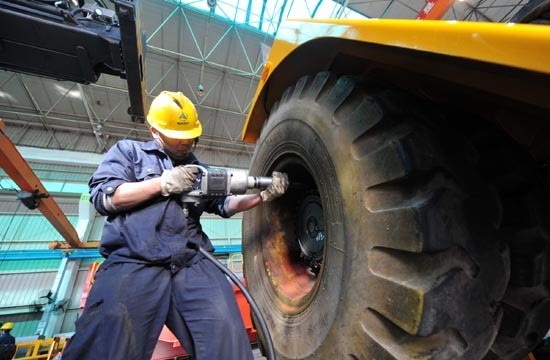
Company plans to garner up to 50% of its sales from overseas markets
China's largest construction machinery company, Sany Group Co Ltd, is reported to be moving its headquarters from Changsha to Beijing, a senior Sany executive confirmed to China Daily on Thursday.
|
 |
|
A workshop of Sany Heavy Industry Co Ltd in Changsha, Hunan province. Sany is set to move its headquarters and major business units from Changsha to Beijing, in a bid to globalize its operations. [Photo/Xinhua]? |
The Xiaoxiang Morning Herald newspaper reported that the decision was announced at a breakfast meeting on Wednesday by company Chairman Liang Wengen.
The executive, who declined to be named, said: "The impact of the decision still remains to be seen."
Up to Thursday, there has been no official announcement from the company.
The share price of Sany Heavy Industry Co Ltd, a listed arm of the group, fell by 1.66 percent on Thursday in Shanghai, while Sany International's share price dipped 0.26 percent on the Hong Kong stock market.
The newspaper reported that the headquarters move should be finalized within two months. The company's new headquarters will be in Beijing's Changping district where Sany bought land in 2003 to set up its rotary- drilling rig branch.
The report said the board of directors and chairman's office of Sany Heavy Industry, and the group president's office will be among the first to move, starting no later than the end of December.
Of Sany's four core businesses located in Changsha - cranes, road construction machinery, port machinery and pumpover machinery - only the pumpover machinery business will remain in Changsha, the report said, with all three others moving to Beijing.
But a staff member from the group's publicity department told China Daily he could not confirm the report on when, and which branch, will move to Beijing.
The Xiaoxiang Morning Herald and industry analysts said the decision has been triggered by the enterprise's global ambitions. But the publicity officer could not confirm if the decision was related to the company's global strategy.
China's slowing economic growth is taking its toll on the construction equipment supplier. In the first three quarters of this year, Sany Heavy Industry's sales grew just 1.46 percent year-on-year, with sales in the third quarter even dropping 18.3 percent.
Chairman Liang said earlier this month in Beijing that the economic slowdown this year has affected the heavy-machinery industry to some extent.
Sany Vice-President He Dongdong said last month that as its domestic sales slowed, overseas sales grew strongly. Sany's exports surged 50 percent year-on-year between January and September.
The company has accelerated its international presence through mergers and acquisitions. In January, it agreed to acquire a 90 percent stake in Putzmeister, a German manufacturer of concrete pumps, for 324 million euros ($417 million).
In February, Sany and Austria-based Palfinger announced a market venture to make and sell mobile cranes, a project with a total investment of $143 million, plus the construction of a sales unit in Salzburg, Austria, for $5.4 million.
But its ambitions in the United States market were hindered at the end of September when US President Barack Obama ordered the dismantling of the four wind farms the company had acquired in the state of Oregon , citing national security concerns. The company then sued Obama and the Committee on Foreign Investment in the US.
But Liang said the company will continue its globalization strategy and plans to garner 40 to 50 percent of its sales from the overseas market. Its revenue from overseas this year is 10 billion yuan ($1.6 billion), 15 percent of total sales value.
The headquarters move evokes memories of 1992, when the private company moved its headquarters from Lianyuan, a small county in central Hunan, to Changsha, the provincial capital, in an effort to expand its business.
Since then it has seen rapid development, growing to become the world's sixth-largest construction machinery manufacturer with total sales of around 66.7 billion yuan this year.
Ge Shunqi, deputy head of the Institute of International Economics at Nankai University in Tianjin, said moving headquarters to Beijing is unavoidable for a company with global ambitions.
Contact writers at zhengyangpeng@chinadaily.com.cn and fengzhiwei@chinadaily.com.cn